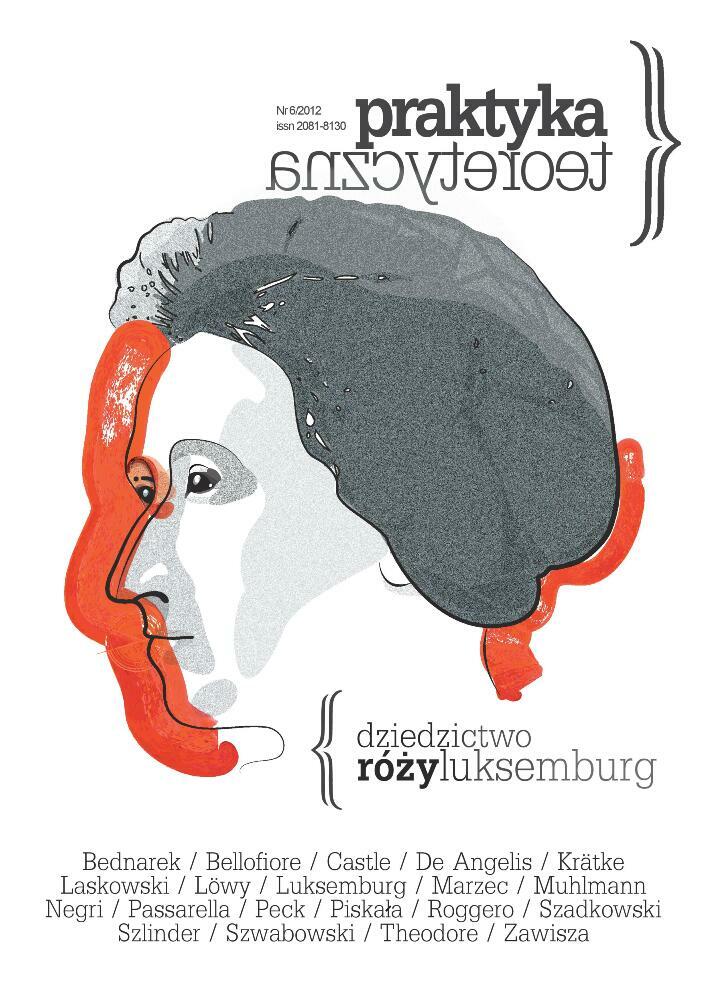Abstract
This article attempts to prove the political relevance of Luxemburg’s
achievements in political economy. It presents the current usages of Luxemburg’s
concepts in finance theory and theory of monetary circuit and shows its usefulness
in explaining the present economic crisis as well as in building proper revolutionary
strategies in reaction to catastrophic consequences of neoliberal capitalism. The
author argues that Luxemburg’s perspective is in-between a working class perspective
and capital’s perspective (in Harry Cleaver’s terms) and emphasizes the political
character of her solutions to problems in economic theory.
References
Bellofiore R. 2004. ‘Like a candle burning at both ends’: Rosa Luxemburg and the Critique of Political Economy. W Neoliberalism in Crisis. Accumulation and Rosa Luxemburg’s Legacy: Research in Political Economy 21. Amsterdam: Emerald Group Publishing Limited.
Bellofiore R. 2009. General Introduction: Rosa Luxemburg on Capitalist Dynamics. Distribution and Effective Demand Crises. W Rosa Luxemburg and the Critique of Political Economy. London: Routledge.
Bellofiore R. 2009. The Monetary Circuit of Capital in the Anti-Critique. W Rosa Luxemburg and the Critique of Political Economy. London: Routledge.
Cleaver H. 2011. Polityczne czytanie Kapitału. Poznań: Bractwo Trojka.
Dalla Costa M. S. James. 1972. The Power of Women & the Subversion of the Community. Bristol: Falling Wall Press.
De Vroey M. 1988. Il circuito della moneta: due Interpretazioni. W Moneta e Produzione. Turyn
Foley D., Duménil G. 2008. Marxian Transformation Problem. W The New Palgrave Dictionary of Economics. Basingstoke: Palgrave Macmillan.
Graziani A. 2004. The Monetary Theory of Production. Cambridge: Palgrave Macmillan.
Keynes J. M. 2013. Ogólna teoria zatrudnienia. procentu i pieniądza. Warszawa: Wydawnictwo Naukowe PWN.
Kowalik T. 1971. Róża Luksemburg: teoria akumulacji i imperializmu. Wrocław.
Kowalik T. 2009. Luxemburg’s and Kalecki’s theories and visions of capitalist dynamics. W Rosa Luxemburg and the Critique of Political Economy. London: Routledge.
Luksemburg R. 1959. Wstęp do ekonomii politycznej. Warszawa: Książka i Wiedza.
Luksemburg R. 2005. Reforma socjalna czy rewolucja. W Kryzys socjaldemokracji. Warszawa: Książka i Prasa.
Luksemburg R. 2011. Akumulacja kapitału. Warszawa: Książka i Prasa.
Mandel E. 1982. Introduction. W Capital: a Critique of Political Economy. Vol. 1. London.
Marks K. 1951. Kapitał. Krytyka ekonomii politycznej. Warszawa: Książka i Wiedza.
Marks K. 1965. Płaca robocza i kapitał. W Dzieła. t. 6. Warszawa: Książka i Wiedza.
Marks K. 1986. Zarys krytyki ekonomii politycznej. Warszawa: Książka i Wiedza.
Messori M. 2005. A. Zazzaro. Single Period Analysis: Financial Markets. Firms’ Failures and Closure of the Monetary Circuit. W The Monetary Theory of Production. Basingstoke.
Passarella M. 2012. „Finanse i problem realizacji u Róży Luksemburg: interpretacja „cyrkulatywistyczna””. Praktyka Teoretyczna 6 : 275-298.
Robinson J. 1960. Szkice o ekonomii marksowskiej. Warszawa: PWN.
Toporowski J. 2009. Rosa Luxemburg and Finance. W Rosa Luxemburg and the Critique of Political. London: Routledge.
License
“Theoretical Practice” seeks to put into practice the idea of open access to knowledge and broadening the domain of the commons. It serves the development of science, thinking and critical reflection. The journal is published in open-access mode under the CC-BY-NC-SA 4.0 license (detail available here: http://creativecommons.org/licenses/by-nc-sa/4.0/). Articles published in the journal may be freely distributed, stored, printed and utilized for academic and teaching purposes without restrictions.
They should not be, however, used for any commercial purposes or be reconstructed into derivative creations. Access to the journal may not be limited or offered for a fee by any third party.
Prospective authors are obliged to fill in, sign and send back the publishing contract compliant with the CC licencing. [PL.pdf, PL.doc, EN.pdf,EN.doc].
According to this contract, authors grant the journal a non-exclusive right to publish their work under the creative commons license (CC-BY-NC-SA 4.0) without any financial obligation on both sides of the contract.
Before submission authors should make sure that derivative materials they use are not protected by copyright preventing their non-commercial publication. Authors are responsible for any respective copyright violations.
